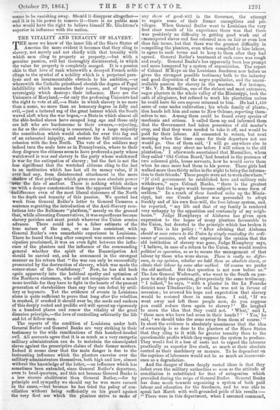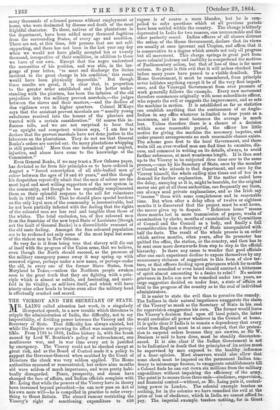THE VITALITY AND TENACITY OF SLAVERY. fr HE more we
know of the inner life of the Slave States of
America the more evident it becomes that they cling to slavery, not merely and not chiefly with that tenacity with which men cling to property as property,—but with a genuine passion, evil but thoroughly disinterested, in which the value for property is completely merged. It is a passion akin to that love of rank wherewith a decayed French noble clings to the symbol of a nobility which is a perpetual para- lysis and an insurmountable obstacle to his ambition,—or wherewith the Catholic priesthood cherish the dogma of Papal infallibility which manacles their reason, and of temporal sovereignty which destroys their influence. Here are the Unionists of Maryland,—for only the professing Unionists had the right to vote at all,—a State in which slavery is no more than a name, no more than an honorary degree in folly and evil, —just a tattered rag of the great banner which the South waved aloft when the war began,—a State in which almost all the able-bodied slaves have escaped long ago and those only are left who are burdensome to their owners,—rejecting, as far as the citiren-voting is concerned, by a large majority the constitution which would abolish for ever this fag end -of an exhausted iniquity, and restore the full attraction of cohesion with the free North. The vote of the soldiers may indeed turn the scale here as in Pennsylvania, where to their -deep disgrace the citizens seem to have preferred a party whose watchword is war and slavery to the party whose watchword is war for the extirpation of slavery; but the fact is not the Less significant that the wretched citizens cling to the last to an institution which has lost all its money value, if it ever had any, from disinterested attachment to the mere shadow of that privilege which gives one man absolute power over the fate of another. There is nothing which strikes us -with a deeper consternation than the apparent blindness or indifference even of the most liberal statesmen of the North to the depth and tenacity of this passion. We quoted last week from General Butler's letter to General Cameron a sentence regretting the introduction of the Anti-Slavery reso- lutions into the Baltimore "platform," merely on the ground that, while alienating Conservatives, it was superfluous because slavery perishes and must perish wherever the Union armies advance. There could not be a falser estimate of the true nature of the case, or one less consistent with General Butler's own remarkable experience in Louisiana. There he found that long after conquest was secure and eman- cipation proclaimed, it was an even fight between the influ- ence of the planters and the influence of the commanding general whether the spirit of the Emancipation Act should be carried out, and he announced in the strongest manner on his return that "the war can only be successfully prosecuted by the destruction of slavery, which was made the corner-stone of the Confederacy." Now, he has slid back again apparently into the habitual apathy and optimism of the Northern statesmen, who will not recognize -what a much more terrible foe they have to fight in the hearts of the present generation of slaveholders than any they can defeat by artil- lery or bayonets. Yet the evidence of events in Louisiana alone is quite sufficient to prove that long after the rebellion is crushed, if crushed it should ever be, the seeds and suckers of this deeply rooted and prolific evil will sprout up vigorously in a hundred places and renew the vitality of the great disunion principle,—the love of controlling arbitrarily the life and lot of fellow-men.
The reports of the condition of Louisiana under both General Butler and General Banks are very striking in their testimony to the wide ramifications of this hundred-headed evil. All accounts agree that it is as much as a very energetic military administration can do to maintain the emancipated slaves against the prescriptive claims of their former masters. Indeed it seems clear that the main danger is due to the insinuating influence which the planters exercise over the military administrators themselves, both high and low, almost without the knowledge of the latter, —an influence which has sometimes been extended, since General Butler's departure, oven to head-quarters, and this not because General Banks is a less sincere abolitionist than General Butler,—for by principle and sympathy we should say he was more earnest in the cause —but because he has tried the policy of con- ciliation without being sufficiently on his guard against the very first use which the planters strive to make of any show of good-will in the Governor, the attempt to regain some of their former exemptions and pri- vileges. When General Butler went to Louisiana the very first clear result of his experience there was that there was positively no difficulty in getting good work out of emancipated slaves and free coloured men on fair or even less than fair terms, but that there was the greatest difficulty in compelling the planters, even when compelled to hire labour, to agree to such terms and to keep to them after they had agreed. General Butler's treatment of such cases was rough and ready. General Banks's has apparently been less prompt and more hampered by a system of organization. The retort of Colonel M'Saye on the Louisiana freedmen now before us gives the strongest possible testimony both to the industry and good disposition of the negro population, and the uncon- trollable passion for slavery in the masters. For instance, "Mr. V. B. Marmillon, one of the richest and most extensive, sugar planters in the whole valley of the Mississippi, took the oath of allegiance, but refused to work his plantation unless he could have his own negroes returned to him. He had 1,450 acres of cane under cultivation; his whole family of planta- tion hands left him and came to New Orleans, reporting them- selves to me. Among them could be found every species of mechanic and artisan. Is called them up and informed them that the Government had taken possession of old master's crop, and that they were needed to take it off, and would be paid for their labour. All consented to return, but next morning when the time came for their departure not one would go. One of them said, will go anywhere else to work, but you may shoot me before I will return to the old plantation.' I afterwards ascertained that Marmillon, whom they called 'Old Cotton Beard,' had boasted in the presence of two coloured girls, house servants, how ho would servo them when he once more had them in his power. These girls had walked more than thirty miles in the night to bring the informa- tion to their friends.' These people were set to workelsewhere." " If civil government be established here and military rule withdrawn," says Colonel Hanks, "there is the greatest danger that the negro would become subject to some form of serfdom." In a reach of three hundred miles up the Missis- sippi, but one Creole planter was persuaded to adopt frankly and of his own free-will, the free-labour "item, and. he reported, "my life and that of my family is rendered very unhappy by the opposition and contumely of my neigh- bours." Judge Humphreys of Alabama has given open expression to the hopes of many planters favourable to the Union, but devoted to the principle which has broken it up. This is his policy : "After advising that Alabama should at once return to the Union by simply rescinding the ordi- nance of secession, and after expressing the opinion that the old institution of slavery was gone, Judge Humphrey sap, I believe, in case of a return to the Union, we would receive political co-operation, so as to secure the management of that labour by those who were slaves. There is really no differ- ence, in my opinion, whether we hold them as absolute slaves, or obtain their labour by some other method. Of course we prefer the old method. But that question is not now before us." The late General Wadsworth, who went to the South on pur- pose to study the question, gives precisely the same testimony. "I talked," he says, "with a planter in the La Fourche district near Tibadouville; he said he was not in favour of secession ; he avowed his hope and expectation that slavery would be restored there in some form. I said, If we went away and left these people now, do you suppose you could reduce them again to slavery ? ' He laughed
to scorn the idea that they could not. What,' said. I, these men who have had arms in their hands ? " Yes,' he said, we should take the arms away from them of course.'" In short the evidence is absolutely unanimous that the idea• of ownership is so dear to the planters of the Slave States that they cling to it with far greater tenacity than to the questionable profits which they suppose the system to produce. They would feel it a loss of caste not to regard the labourer practically as superior live stock, as much at their absolute control as their machinery or manure. To be dependent on the caprices of labourers would not be so much an inconveni- ence as a degradation.
And the danger of these deeply rooted ideas is that they infect even the military authorities so soon as the attitude. of conciliation is substituted for that of antagonism which prevailed during the reign of General Butler. General Banks has done much towards organizing a system of both paid. labour and education for the freedmen, and he was able to speak last March with well-grounded pride of his results :— " There were in this department, when I assumed command, of the richest men in Now Orleans. which arrives months, often years, after its promoter has So very far is it from being true that slavery will die out quitted the office, the station, or the country, and then has to of itself with the progress of the Union arms, that we believe, be sent once more downwards from step to step in the official even though the North should succeed, as the pressure of hierarchy. Is there any cause to wonder that good officials the military emergency passes away it may spring up with after one such experience decline to expose themselves by any renewed vigour, perhaps under a new name, or perhaps under unnecessary richness of suggestion to this form of slow tor- the old, in every one of the former Slave States, from ture, or that officers feeding upon grievances which for months. Maryland to Texas,—unless the Northern people awaken cannot be remedied or even heard should contract a bitterness soon to the great truth that they are fighting with a prin. of spirit almost amounting to a desire to rebel ? No serious ciple which is almost as subtle, and fascinating, and mani- grievance in India can now be remedied under two years, no. fold in its vitality, as self-love itself, and which will have large suggestion decided on under four, a state of affairs as ninety-nine other heads to bruise even after the military head fatal to the progress of the country as to the zeal of individual. is effectually crushed and seared. administrators.



































 Previous page
Previous page